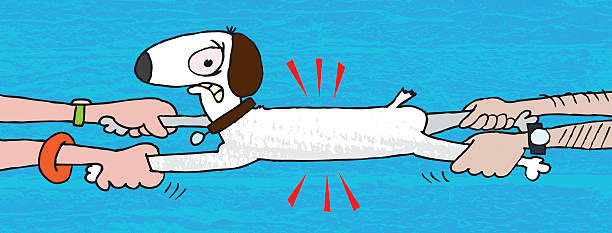People may ask themselves the question “After separation or divorce, who gets the dog?”. For the longest time, pets are given a lot of importance in households. Most people in a household actually treat them as family members because of the unconditional love and comfort they give. While this is just a theoretical framework, are house pets treated as ‘property’ in Australia? In New South Wales (NSW), yes.
The Companion Animals Act 1998 (NSW) states that companion animals, such as dogs, are treated as property during legal proceedings. Property settlement, which generally follows after divorce, allows divorcing couples to divide their assets and finances to prevent legal war. Hence, just like furniture or bank accounts, divorcing couples must decide who gets the family pets.
Indeed, it is preferable for many couples to resolve this divorce horror amicably rather than through the courts. However, disputed couples may escalate issues like these in family courts and let them decide on who will win dog custody. There are a lot of factors when discussing real questions like who gets the dog in a relationship. Read on to find out more.
What Does the Family Law Act Say?
The Family Law Act 1975 governs family matters including property settlement, marriage, and parenting matters. While there are laws for a couple’s children, assets, and finances, there are no specific provisions that deal with house pets. However, there are animals that are significant assets with high monetary value such as:
- Racehorses
- Purebred dogs
- Cattle, chickens, goats, ducks, and any other animal that can help people earn through their produce.
Indeed, most disputed couples consider the emotional value that a dog has even if it is considered as property. However, the court will not view the animal as a significant component of a settlement. Moreover, they may disapprove of the inclusion of a pet as an asset in a settlement. If one party has incurred large expenses in caring for an animal, the courts may allow modification of a settlement.
Who Gets the Dog: Case Example
In the case of Gaynor & Tseh (2018), we will discuss a de facto case regarding a dog. Mr Gaynor sought an interim order that required his de facto partner Ms Tseh to return their dog “B”. The judge classified B as a ‘chattel’ which is a personal possession. As a result, the judge determined that “the subject of the change of a property interest on an interim basis” was the pertinent issue.
Mr Gaynor stated in his affidavit that he met B in 2010 prior to his relationship with Ms Tseh. Furthermore, Mr Gaynor also stated that B was cared for, but Ms Tseh did not agree with this. Why? Ms Tseh stated that Mr Gaynor only wanted B back in order to isolate, intimidate, and punish Tseh for pursuing property settlement and spousal maintenance.
Ms Tseh also met B a year after Mr Gaynor did and both the couple shared an emotional attachment with B. The judge then ruled that there was no comprehensible justification to ‘protect property’ and made no orders for B. The argument over who would keep B would be settled at the final hearing.

Who Gets the Dog: Common Approaches and Hot Tips
1. Personal Negotiations
This is the simplest approach when deciding on who will get the family pet. Did the couple get it when they were together? What if the other partner acquired it prior to the relationship? There are new and better ways rather than taking matters to court. Regardless of when the pet came into the relationship, couples must consider:
- The person who adopted/purchased the pet
- Who spent on the necessities like food, grooming bills, and veterinary bills. In some cases, a partner may have acquired a house pet prior to the relationship, but other couples may have cases like one partner providing more financial contributions.
- How much training did each partner provide?
- Who is the pet more comfortable with? This is one of the most practical hints to decide who gets the family pet during divorce or separation.
- The partner/person who looks after the pet when one or both partners are away. For instance, partner A has a business meeting in a faraway city. Partner B then looks after the pet while partner A is away.
- If the pet has an environment conducive to its best interests if both spouses decide to live apart. For instance, a pet stays with partner A, but does the house have a yard that the pet can explore? Are there nearby veterinary clinics or offices? Can Partner B still visit the pet?
- Whether the couple’s kids also have an emotional attachment to the pet. We can relate the child’s best interests in this factor since children may feel happy and secure when they are with the pet. Hence, this may result in the partner who has parental responsibility over the child getting the pet.
- Whether one partner has not really given much care or attention to the pet.
- If one partner has severe allergic reactions to any animal fur.
Note: Family courts may also consider these factors if the couples have escalated the matter to court.
2. Consent Orders or Binding Financial Agreements (BFA)
Can couples still use consent orders or BFAs if they can’t choose on who gets the dog? Yes. This prevents yet another dirty tactic from a partner who plans to claim more than what they are required to have. Both of these are legally enforceable and can set out provisions for a pet’s care.
If parties agree, they can still use consent orders and have the court enforce them. On the other hand, binding financial agreements can help in setting out how much each parent is willing to allocate for their pet. The parties will divide their property, which will include their pet. When issuing orders that include pets, courts will look at who the pet:
- Has resided with before, during, or after the relationship
- Shares an emotional bond with
- Has relied on for financial expenses

3. Seeking Inexpensive Separation Process With Family Lawyers
Can family lawyers aid in property settlement even if there is a legal battle regarding property matters? Yes. JB Solicitors specialises in family law matters and ensures that the division of assets and finances is just and equitable.
Our family lawyers can offer mediation services for disputed couples who want to find paths and settle things amicably regarding property settlement matters.
Contact us today if you hope to avoid losing custody over your pet during divorce or separation.
